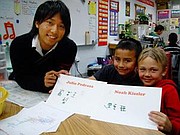Cultural infusion
MOSES LAKE — Twelve Japanese Agricultural Training Program trainees, along with English teacher Susan Blackwell, came to share their culture and language with Longview Elementary students Thursday.
The young Moses Lake students greeted their visitors in Japanese by saying, “konnichiwa,” which means “hello.”
The class eager to learn more about the Japanese culture. They have been studying various countries and the importance of agriculture in other countries. The second graders have learned about the meaning of export, import, supply and demand and how Grant County has an impact, not only to the United States, but to the world with some of the products produced locally.
The trainees and students broke into groups. The trainees began by showing the students where they were from on a map of Japan and which prefecture they lived in. The students knew that Japan’s prefectures are the country’s 47 sub-national jurisdictions, and are governmental bodies larger than cities, towns and villages.
“It’s hard to believe it is about the size of California, with all those people,” Johnai Garcia said.
The students created warrior helmets and origami cranes out of newspaper.
“Learning origami is cool,” Noah Kissler said with a big smile on his face.
The trainees were equipped with electronic translators to help communicate with the younger students.
“This is excellent for the trainees – they are interacting with children and practicing their English,” Susan Blackwell commented.
Each second-grader learned how to write their name in Kanji, a form of Japanese writing.
Ashley Dotson wrote more than her name. She wrote a whole page with the help of one of the trainees.
“I absolutely love writing Kanji! Can we write an essay in Kanji? Please?” Ashley asked.
The trainee smiled as Ashley beamed at her work.
The class and the trainees sang “Are You Sleeping?” in a round. The students started in English and the trainees followed in singing in Japanese.
“Wow, they sing good. It is awesome to hear the song in Japanese,” Katie Bidlen stated.
The students lined up and in chorus told the trainees “arigato,” meaning thanks and then waved while saying, “sayonara,” or goodbye, to the trainees.





